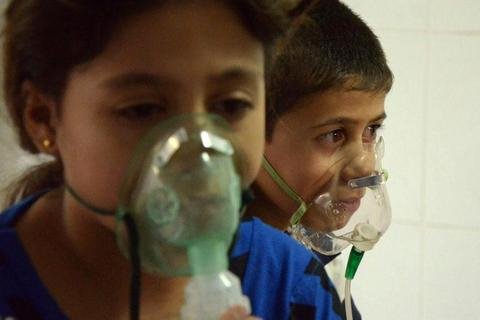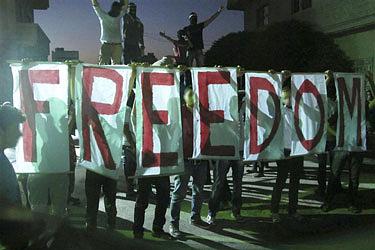 What kind of a world are we living in if the international community looks away from the release of chemical weapons on the citizens of Syria?
What kind of a world are we living in if the international community looks away from the release of chemical weapons on the citizens of Syria?
If the pictures of children choking on their own fluids and heaps of dead bodies piled in the streets of Damascus left any doubt in the mind of the world community, there is sufficient evidence now that Sarin nerve gas was dropped on the innocent citizens of four suburbs of Damascus .
Nerve gas is the most inhumane way of killing. The gas is colorless and odorless and was originally used as a pesticide. It has the exact same effect on the human body as the insecticide has on bugs. It attacks the nervous system causing twitching and convulsions, the heart rate goes out of whack, the nervous system is shut down and finally the body chokes on its own fluids. The gas was released by Saddam Husain in 1988 during the Halbaza massacre in which several thousand Kurdish citizens perished. It was also used in a terrorist attack on a subway in Japan in 1995. The conflict in Syria started in the summer of 2012 when the people of Syria rebelled against President Bashar al-Assad’s regime. It rapidly turned from an insurgency to a civil war. Amid the chaos, Al Qaida seized the opportunity to join the fray. Many political pundits argue that we had a small window last summer to help the rebels before the fundamentalist elements infiltrated the ranks.
The conflict in Syria started in the summer of 2012 when the people of Syria rebelled against President Bashar al-Assad’s regime. It rapidly turned from an insurgency to a civil war. Amid the chaos, Al Qaida seized the opportunity to join the fray. Many political pundits argue that we had a small window last summer to help the rebels before the fundamentalist elements infiltrated the ranks.
The UN’s inability to come to a decision on how to respond to the use of Chemical weapons by Syria against its own citizens, points not only to its inefficacy as a negotiator, but also to the complexity of the situation.
The British parliament has blocked Prime Minister Cameron’s request to join the US in any military strike over Syria. Instead, resorting to rhetoric, Cameron wants to see a “robust response” to Assad’s use of chemical weapons. Is it not amply clear that Assad doesn’t give two hoots about any diplomatic pressure that Prime Minister Cameron seeks to exert?
Russian President Vladimir Putin has dismissed the notion of the chemical attacks by Syria as “utter nonsense.” Backing of Syria by the Russia-Iran coalition with its stockpile of chemical weapons is a matter of dire concern in an already pernicious situation.
We are witnessing President Obama back-pedaling from the “red line” he defined last year in a moment of bravado. Secretary of State John Kerry is aggressively lobbying on the President’s behalf to seek the support of the US Congress to engage in an offensive against Syria.
A war-weary America is divided. After two wars, trillions of dollars in debt and a sluggish economy America is not too keen to be the world’s policeman. George W. Bush’s trigger happy invasion of Iraq based on false evidence is still fresh in the minds of the people.
The anti-interventionists point out that the US did not engage in the two world wars until we were attacked on our soil. Our motives and methods of intervention in the Middle East are deemed far from pure. Many Americans believe that much of the crisis in the region is a repercussion of our meddling over the years.
The situation is further complicated by the fact that a strike against Assad and an effort to tip the balance by strengthening the rebels may empower the extremists within the ranks who have ties to Al-Qaida.
Both the secretary of state John Kerry and Senator McCain (who would have thought the twain would ever agree?) are assuring us that the extremist element is not powerful amongst the rebels in Syria.
Will President Obama get the approval he seeks from Congress? Will a “narrow and limited” strike by the US be effective or merely the equivalent of a punch to a bully who remains undeterred? A greater involvement than the one envisioned at first is quite likely. Is there an exit strategy? Or even a clear and defined goal?
T he advance notice of a military strike has provided ample time to the Syrian regime to move the weapons. Will the US intelligence, which has been far from perfect in preventing terrorist strikes in the US by its own home grown jihadists, be able to locate the exact targets a week or a month from now as the President seems to be confident it can?
While the debate goes on and the dilemma continues, Guru Nanak’s verse articulated in the 15th century amidst the horrific events in India when Babar was reaping atrocities on the subcontinent comes to mind to poke at the conscience of a civilized society:
Je sakta sakte ko mare ta mun ros na hoee
Sakta seh marey pai vagey Khasme sa pursaee
Ratan vigarrh vigoaee kuti moea saae n kaaee SGGS P 360
If a powerful man strikes out against another powerful man, then no one feels any grief or anger, but if a powerful tiger attacks a flock of sheep and kills them, then its master must answer for it. This priceless country has been laid waste and defiled by dogs, and no one cares for the dead.
There may be no easy answers to the horrific situation in Syria. But the world cannot turn a blind eye to the violation of international bans against the use of chemical weapons. It is the moral obligation of the leaders of the international community to show a strong and united front, and come up with a response that is more than a slap on the wrist to the Assad regime. A military strike on Syria is not the responsibility of the US alone.
It is about time that the complete destruction of chemical weapons per the Chemical Weapons Convention of 1993 be carried out and dissenting nations pressured to comply. The possibility of the chemical weapons falling into the hands of terrorists is a real and viable danger, and the world is vulnerable. There are no sacred cows for Jihadists.
It would be perilous to look at the chemical warfare in Syria as an internal matter that is not going to impact the rest of the world.
[email protected]





